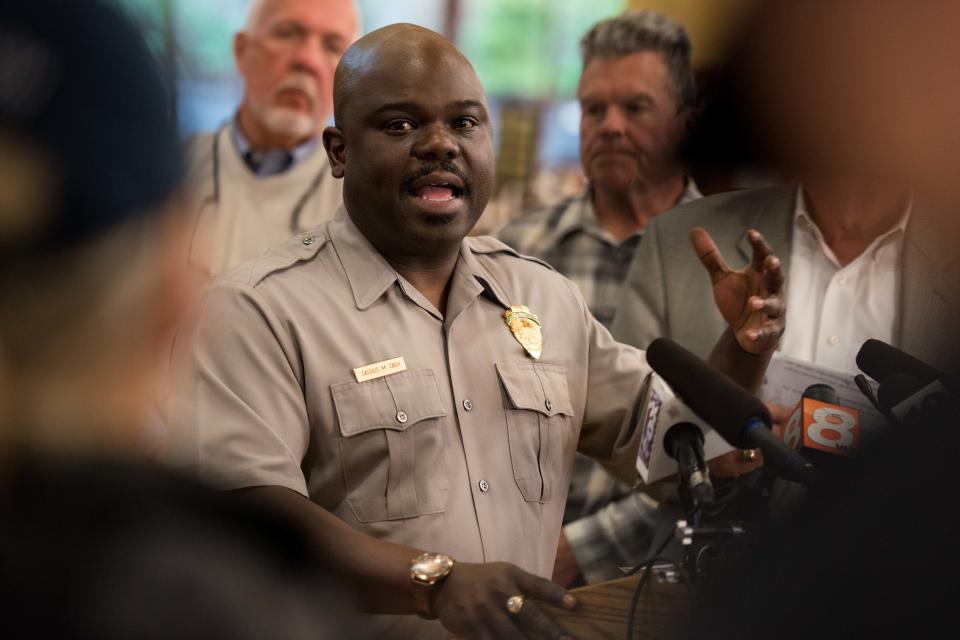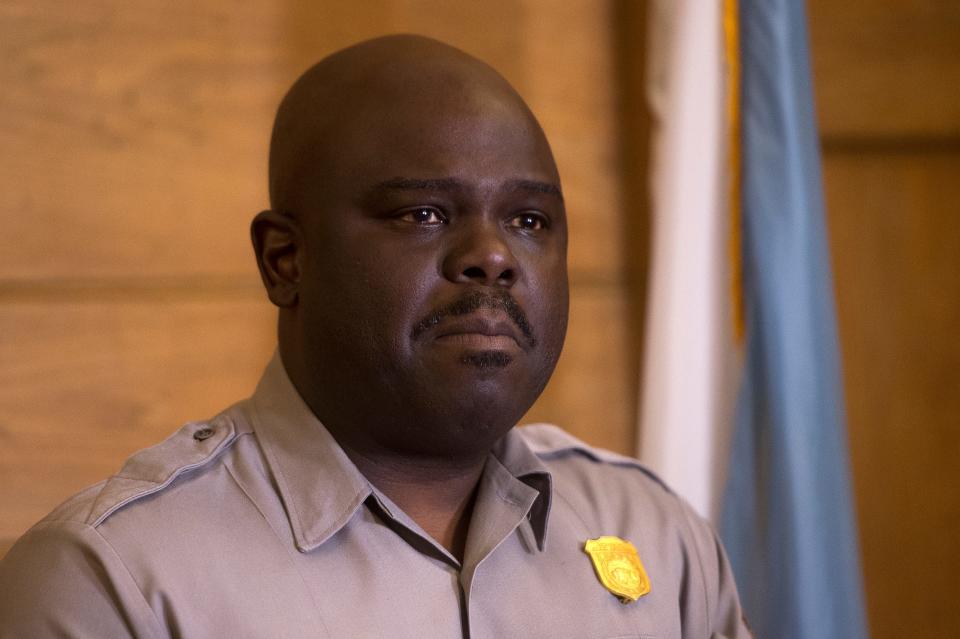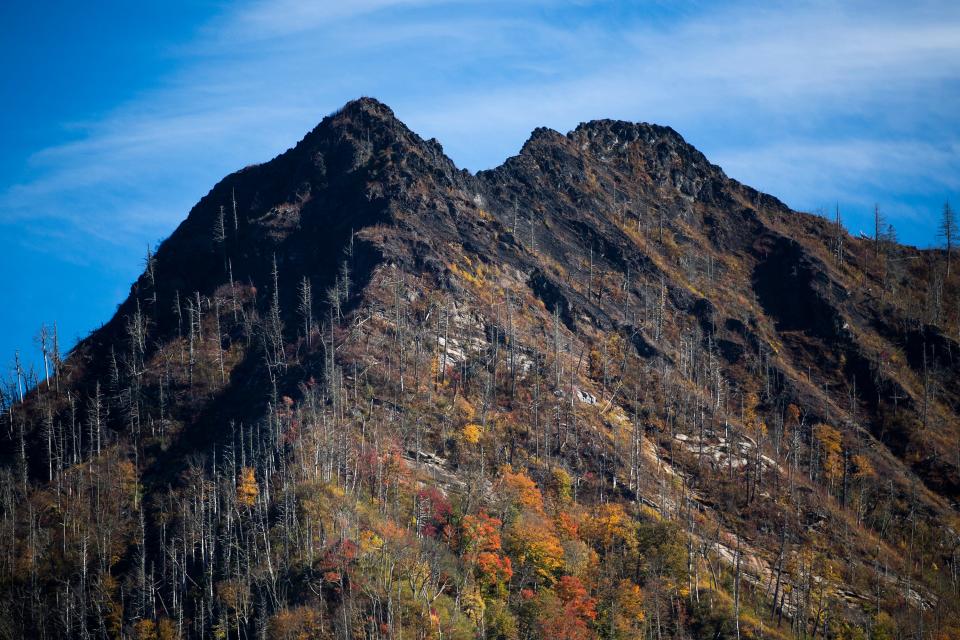Exclusive: As Gatlinburg wildfire raged, park's top leader downplayed the threat
Editor’s note: A National Park Service spokeswoman contacted Knox News on Feb. 9, 2024, to deny that Great Smoky Mountains National Park Superintendent Cassius Cash was the person who took a call early Nov. 27, 2016, from Gatlinburg police dispatch about a civilian’s report that the Chimney Tops fire was growing.
Great Smoky Mountains National Park Superintendent Cassius Cash was famously, like most park personnel, on vacation when fire spread from the tip of Chimney Tops and overtook Gatlinburg during Thanksgiving weekend in 2016.
But Cash still played a role, which has gone unreported until now.
A Gatlinburg Police dispatcher called Cash early the morning of Sunday, Nov. 27 – the day before the fire broke out of the park – to ask about a civilian’s report of a growing fire, but Cash dismissed it, according to an audio recording of the call obtained by Knox News.
Cash's quick dismissal − without checking first with fire officials − goes against what wildland fire experts say are best practices for officials handling a fire. At the time of the call his information on the fire's location was 11 hours old. Fortunately for Cash, the fire hadn't grown as the civilian thought, so his apparent haphazard treatment of the situation didn't have consequences.
Regardless, Cash couldn’t have known what was going on atop Chimney Tops. Nobody knew. Fire Management Officer Greg Salansky left nobody watching the small fire any of the five nights it burned, including Sunday as it began to creep towards Gatlinburg. This too was questioned by experts in wildland fire who routinely require someone keep watch of fires overnight.
That lack of oversight set the park back come Monday morning as the fires broke out of the park and wreaked havoc on unsuspecting Gatlinburg. Ultimately, 14 people died and hundreds were injured and displaced.
These errors, combined with others, led the Chimney Tops blaze to become one of the worst natural disasters in Tennessee history and, experts said, show neither the superintendent nor other emergency personnel and fire officials fully realized the danger they were in.
A park spokesperson declined to answer a list of questions, including whether they could confirm Cash took the call. Whoever took the call was in an authority position in the park.
A former park employee who had radio access identified Cash's voice and Knox News matched it to separate audio of Cash speaking. The call is very clearly not Deputy Superintendent Clay Jordan, the man in charge that week, or Salansky, the fire management officer, according to separate audio recordings reviewed by Knox News.
In a combined statement to Knox News, city and county leaders said the newspaper's new findings further bolster the after-action report which largely blamed the park for their lack of communication with leaders outside the park. "This information confirms that the contents of the After Action Review report, which the City of Gatlinburg and Sevier County Government commissioned ABS Group to perform, was correct."
Cash gets called about a potentially growing fire
At 3:06 a.m. Sunday a Gatlinburg Police dispatcher – who is unnamed in the recording – received a call from a Gatlinburg police officer telling him about a civilian report of a fire in the Chimneys Picnic Area, a spot roughly one mile as the crow flies from the peaks of Chimney Tops.
This is notable. The fire was less than 10 acres in size by the end of Saturday. It was a small fire. A report − even an unsubstantiated report − of growth should have set off alarm bells, according to wildland fire experts who spoke to Knox News. Fire in the picnic area would show substantial growth and change how the park was handling the blaze (when fire was later confirmed at the picnic area Monday, it was estimated to be 250-500 acres).

Unsure of what to do, but not wanting to ignore the question, the dispatcher calls the park’s communication center at 3:08 a.m., but no one is working the phones after hours. When he gets no answer, he hangs up. Next, he calls the cell phone of an unknown official, which also goes unanswered. The dispatcher again hangs up.
At this point the dispatcher dials Cash at 3:10 a.m., waking him up. The following is a transcript of their conversation:
Cash: “Hmm … (intelligible).”
Dispatch: “Yes, this is Gatlinburg Police Department.”
Cash: “Yes sir.”
Dispatch: “I hate to call and wake you up, especially on something like this, but somebody stopped one of my police officers and asked or told him there’s a fire up around the Chimneys campground.”
Cash: “Mhm.”
Dispatch: “He said ‘Are y’all working a fire up there right now or had you been working a fire up there?’”
Cash: “We are. We have been working for multiple days.”
Dispatch: “OK.”
Cash: “Last report I had was when I was on (unintelligible), about 1600 (4 p.m.). The fire is way up at the very top of the Chimneys in high altitude on a rocky slope and its almost vertical. We can’t fight it with manpower.”
Dispatch: “OK”
Cash: “So it’s just burning, and smoke is drifting down towards the road. It’s basically not threatening (intelligible) in any way … it’s just doing its thing.”
Dispatch: “Yeah, we’re just making sure it’s the same fire you all knew about. We just making sure you all knew about it.”
Cash: “As far as we know it is. That match the area they’re talking about?”
Dispatch: “Yeah, he said it was up around the top of the Chimneys somewhere.”
Cash: “OK good. I was hoping it wasn’t another one.”
Dispatch: “OK all right. We were just making sure, we were double checking, OK? I didn’t want to wake you up, but I didn’t want to not call somebody (and them say), ‘No, I didn’t know about a fire up there. Oops.’”
Cash: “No problem. Call anytime.”

Dispatch: “All right, well thank you.”
Cash: “Yes sir.”
Dispatch: “All right, bye-bye.”
Fire likely false alarm
There's no report of a fire in the Chimney Tops Picnic Area Sunday; that wouldn't come until 7 a.m. Monday, just before sunrise.
Why the dispatcher changed the location of the fire on second reference – from the Chimney Tops Picnic Area to “top of Chimneys somewhere” – or whether he was just confused, is not clear.
Cash provided information that was 11 hours old
Knox News cannot say for certain what information Cash was referring to when he dismissed the report at 3 a.m. Sunday and a park spokesperson declined to answer a list of questions, including whether Cash took the call, citing pending litigation.
There is no reported media gathering or updates given either Saturday or Sunday, according to the park's fire review report, but it is likely that Cash was referencing a fire update to park officials Saturday afternoon when he told the dispatcher his update was from 1600 (4 p.m.).
Knox News has obtained park dispatch logs and transcripts of the calls from the week of the fire. On Saturday at 4:13 p.m. Salansky gives an update on the fire over the radio. His remarks are nearly identical to what Cash tells dispatchers.
"Yeah, just give you an update on this Chimney Two fire, uh, it’s probably about 6 acres, it is actively burning still, it is producing quite a bit of smoke and it’s starting to settle, um, down along the road in certain places (unintelligible)," Salansky said. "There is no threat to the roads, uh, it’s very high up on the mountain, no threat to anybody, um, I know you’ll get calls but it’s just kinda do what it does. We’re just gonna basically have it in the monitoring, uh, mode as of right now. It’s all we can do to it."
'You don't know what you don't know'
Bobbie Scopa is a wildland fire expert based in the Pacific Northwest who was sent to assist the Southern Area Coordination Center − a regional fire center − in November 2016 and worked out of their Atlanta office during the Chimney Tops fire (even on Thanksgiving Day, she noted). This same office sent advice to Salansky, the park’s fire management officer, leading up to the wildfire.
Scopa served four decades as a wildland firefighter, including time as assistant fire director for all wildland fire operations in Oregon, Washington and Alaska for the U.S. Forest Service. She also has a podcast and has written a book about her experience as a wildland firefighter.
Knox News spoke to her about the dispatch phone call to Cash, which she found troubling. The bottom line, she said, is officials weren’t ready for what hit them. You don’t know what you don’t know, she said.
“If you’ve never seen something happen and you know about it and have read about it in books, but you haven’t seen it or the folks around you haven’t seen it, it might tend for you to not believe it’s going to happen.”
The fact that police dispatch didn’t relay fire information to the national park dispatch or to Salansky, the man in charge of the fire, shows they were unprepared, she said. Such a call could have drastically changed the outcome.
She said Cash wasn’t prepared and his response to the dispatcher informing him the fire had potentially expanded ten-fold, was not a proper response. Equally troubling is Cash’s apparent decision to not alert Salansky of the unsubstantiated report.
“If you had an experienced park superintendent from the west – say from Yosemite or Yellowstone or Sequoia – they’d be like ‘holy shit, we better jump on it.’
“That to me is an indication that they’re just not experienced in having active critical fire decision making,” Scopa said.
Chuck Bushey is a career wildland firefighter and former president of the International Association of Wildland Fire. He and his wife traveled through the Smokies on vacation in 2016 weeks before the Chimney Tops fire. The conditions were ripe for fire, he said, and he remembers the thought made the hair on the back of his neck stand up.
He agreed with Scopa’s perspective on Cash’s call and said it’s not how he would’ve handled it.
“From my perspective, any call a fire staff gets they need to check on immediately,” he said. “Whether it’s an official from police or fire or even a civilian phoning it in, they need to get on that as soon as possible.”
Separately, Scopa said that lack of experience could have possibly led Cash to not seek updated information. Again, the information he relayed back to police dispatch was at 11 hours old.
Both Scopa and Bushey said in their experience, updates are typically provided in the morning and afternoon and whenever there is an important development.
“(The frequency of updates) depends on the agency administrator’s (Cash’s) level of comfort and unfortunately, their level of comfort is often based on their experience,” Scopa said. “Because if you don’t have any experience a lot of times you’re very comfortable because you just don’t know any better.”
Knox News could not confirm whether Cash was getting regular updates. He apparently knew of Salanksy's report from Saturday and the park's fire review shows he got an update Friday. But he was on vacation the Wednesday before Thanksgiving until Monday, the day the fire broke into Gatlinburg.
Other concerns
Nobody watching the fire
Scopa said in the hundreds of fires she has helped oversee she almost always – 95% of the time, she said – had someone camping overnight on a nearby ridgetop with a camera and a radio just watching the fire, ready to report new information. Salansky decided to leave the Chimneys burning unmonitored every night of the fire, including Sunday night when it grew.
Bushey too said it is unusual for a fire not to be watched overnight, particularly given the worsening (and forecasted) conditions.
Everyone was simply unprepared
Scopa said police dispatch’s unfamiliarity with whom to call showed a lack of preparedness.
“Because in my world, I have moderated exercises in communities with sheriff’s offices and police departments and utility districts and railroads and federal agencies, etc. to play out exactly this situation.”

In these situations crews simulate fire scenarios and go over in extreme detail what the plan of action is, who calls whom, who do they call next, what is the response, etc.
“This is obviously something these folks were not prepared for. And I don’t blame the park service … in the southeast, it’s not the same as it is out west. It’s so different.”
Salansky had been advised to keep Cash in the loop
As previously reported by Knox News, Salansky had only been in his role as fire management officer for eight months. He received – and readily accepted – advice from officials like Shawn Nagle, a regional wildland fire and aviation management officer in Atlanta, who had done similar jobs for years.
Two weeks before the Gatlinburg fire, Nagle sent Salansky an email with some pointers, which included advice on keeping Cash in the loop. There is plenty of record of Salansky updating park officials that week, but little to suggest he was updating Cash while he vacationed outside of an update he sent Cash Friday, according to the documents obtained by Knox News.
Similarly, the after-action report notes Salansky updated Cash about the fire at least once during the week, but the last recorded update was Friday.
The report would go on to say that none of the park's top officials − Cash, Deputy Superintendent Clay Jordan and Chief Ranger Steve Kloster − had taken a Fire Management Leadership course, a requirement for Cash, as superintendent. Instead, the three relied on Salansky, who was new to the job.
Salansky declined to comment, citing the pending litigation. A spokesperson for Sequoia National Park where Jordan is now park superintendent did not respond to request for comment. Phone calls and text messages sent to numbers associated with Kloster were not returned.
Park officials’ lack of urgency cost lives
Salansky contacted the Gatlinburg Fire Department only after department officials began asking questions about Chimney Tops Monday morning. By that point the fire had been burning in the park for five days.
A third-party after-action report paid for by Gatlinburg and Sevier County put much of the blame for the disaster that followed on a lack of communication.
The report, which did not review the park’s actions, said “more timely and accurate communication” from the park would’ve helped the city prepare for the disaster. “In retrospect, firefighting and evacuation plans would likely have been better directed and accelerated if more accurate fire location data from the GSMNP personnel and NWS (National Weather Service) wind data had been used to model fire progression,” it said.
The park's failure to warn nearby communities, a violation of its own fire management plan, has become the central question of a massive federal lawsuit. The Park Service's rules say adjacent communities should be notified of “all planned and unplanned fire management activities that have the potential to impact them.”
Cash defended park’s actions after the blaze
Later that week, in a contentious press conference following the destruction, Cash defended the park’s actions leading up to the fire’s explosion into Gatlinburg.
"I don't have the jurisdiction to evacuate a town," Cash said. "We work collectively and that's exactly what we did on Monday, working with the city manager, myself, the fire chief, saying, 'OK, this is within a certain proximity; it is prudent for us now to start thinking about what would be ... "
Cash was interrupted by a reporter during the news conference, which was then cut short by Sevier County Mayor Larry Waters.
Tyler Whetstone is an investigative reporter focused on accountability journalism. Connect with Tyler by emailing him at tyler.whetstone@knoxnews.com. Follow him on Twitter @tyler_whetstone.
Make our community, our society and our republic stronger by supporting robust local journalism. Subscribe online at knoxnews.com/subscribe.
This article originally appeared on Knoxville News Sentinel: Smokies park leader downplayed Gatlinburg wildfire threat with old info

